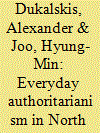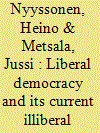|
|
|
Sort Order |
|
|
|
Items / Page
|
|
|
|
|
|
|
| Srl | Item |
| 1 |
ID:
177866


|
|
|
|
|
| Summary/Abstract |
This article examines the response of regional elites in Soviet Belarus to the new nationalities policy introduced by Lavrentii Beria in his bid for power after Stalin’s death in 1953. The scenario, which had successfully played out in Ukraine, Lithuania and Latvia, was resisted by Belarus, where Russian First Secretary Nikolai Patolichev remained in post, despite Moscow’s orders. A key role in this was played by the republic’s regional secretaries. Their unwillingness to denounce their patron highlighted the emerging importance of regional networks and set an important precedent for the post-Stalin relationship between Moscow and the ethnic periphery.
|
|
|
|
|
|
|
|
|
|
|
|
|
|
|
|
| 2 |
ID:
177862


|
|
|
|
|
| Summary/Abstract |
This article examines the political consequences of widespread social changes in North Korea to illuminate how, if at all, shifts in everyday life influence the power of an autocratic government. Our study is based on 23 interviews with North Korean defectors in 2017 and supplemented by interviews conducted in previous years. The main finding is that social practices associated with marketisation, flows of information, and increased corruption have not yet provided the foundation for collective challenges to the regime. It is, however, also clear that official norms, rules, and institutions have been significantly weakened to adapt to new social realities.
|
|
|
|
|
|
|
|
|
|
|
|
|
|
|
|
| 3 |
ID:
177860


|
|
|
|
|
| Summary/Abstract |
Central Asian states are more complex than what a first glance at their authoritarian nature might suggest. Despite their relatively recent independence, they have strengthened and managed to effectively improve their economic performance. This article aims at analysing two case-studies, Kazakhstan and Uzbekistan, and demonstrating how their statehood evolved in relation to both domestic dimensions (such as the traditional legacy of clans and the more recent Soviet experience) and powerful international influences, especially those of Western-driven neoliberalism, neighbouring Russia and China. While neoliberalism has had a significant impact on Kazakhstan, Uzbekistan has remained more anchored to the legacy of the Soviet Union. Yet both states have demonstrated autonomy in their economic choices and strong political agency; far from being pawns in the hands of Great Powers, they are active protagonists of twenty-first century global politics.
|
|
|
|
|
|
|
|
|
|
|
|
|
|
|
|
| 4 |
ID:
177849


|
|
|
|
|
| Summary/Abstract |
This article focuses on the challenge of illiberalism to democracy, even though the nature of this contestation is ambiguous. The illiberal critique of liberal democracy is contextualised using conceptual history and two major ‘political credit ratings’, namely the Democracy Index and the Freedom in the World Report. Empirically we concentrate on Hungarian politics, which we consider to be an example of soft authoritarianism, drawing on two key speeches by Prime Minister Viktor Orbán: his launch of the idea of the ‘illiberal state’ in 2014 and his emphasis on ‘Christian democracy’ after the 2018 election campaign.
|
|
|
|
|
|
|
|
|
|
|
|
|
|
|
|
| 5 |
ID:
177853


|
|
|
|
|
| Summary/Abstract |
Is Vladimir Putin’s Russia rising, stagnating or falling? Contradictory views on the dynamics of Russia’s national power inform policies and decisions with strong and lasting effects on international affairs and global security. The authors used three existing quantitative methods of measuring national power and introduced one experimental method to measure Russia’s national power and compare it with that of the leading Western states, BRICS members, former Soviet republics and oil-dependent economies. All methods demonstrated that Russia was rising against its Western competitors in 1999–2016 but trailed behind the United States, China and India in absolute national power value, though, whether Russia would be able to maintain that dynamic beyond that period was doubtful.
|
|
|
|
|
|
|
|
|
|
|
|
|
|
|
|
| 6 |
ID:
177856


|
|
|
|
|
| Summary/Abstract |
The high level of support enjoyed by the authoritarian regime in Russia has been interpreted as evidence of the reactionary character of Russian mass consciousness. We question this view by adopting a neo-Gramscian perspective on popular culture and common sense. We view common sense as protean, combining incongruous beliefs and ideological elements. Our study of Russian women’s fiction finds that contrary to the canons of the genre, Russian authors often display their ideological preferences openly. These can be either pro-government or oppositional, which, given the wide appeal of this literature, suggests that Russian mass common sense is politically diverse.
|
|
|
|
|
|
|
|
|
|
|
|
|
|
|
|
|
|
|
|
|